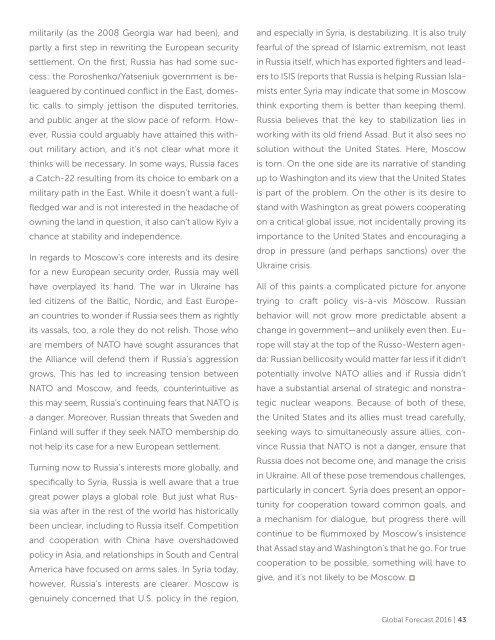Create successful ePaper yourself
Turn your PDF publications into a flip-book with our unique Google optimized e-Paper software.
militarily (as the 2008 Georgia war had been), and<br />
partly a first step in rewriting the European security<br />
settlement. On the first, Russia has had some success:<br />
the Poroshenko/Yatseniuk government is beleaguered<br />
by continued conflict in the East, domestic<br />
calls to simply jettison the disputed territories,<br />
and public anger at the slow pace of reform. However,<br />
Russia could arguably have attained this without<br />
military action, and it’s not clear what more it<br />
thinks will be necessary. In some ways, Russia faces<br />
a Catch-22 resulting from its choice to embark on a<br />
military path in the East. While it doesn’t want a fullfledged<br />
war and is not interested in the headache of<br />
owning the land in question, it also can’t allow Kyiv a<br />
chance at stability and independence.<br />
In regards to Moscow’s core interests and its desire<br />
for a new European security order, Russia may well<br />
have overplayed its hand. The war in Ukraine has<br />
led citizens of the Baltic, Nordic, and East European<br />
countries to wonder if Russia sees them as rightly<br />
its vassals, too, a role they do not relish. Those who<br />
are members of NATO have sought assurances that<br />
the Alliance will defend them if Russia’s aggression<br />
grows. This has led to increasing tension between<br />
NATO and Moscow, and feeds, counterintuitive as<br />
this may seem, Russia’s continuing fears that NATO is<br />
a danger. Moreover, Russian threats that Sweden and<br />
Finland will suffer if they seek NATO membership do<br />
not help its case for a new European settlement.<br />
Turning now to Russia’s interests more globally, and<br />
specifically to Syria, Russia is well aware that a true<br />
great power plays a global role. But just what Russia<br />
was after in the rest of the world has historically<br />
been unclear, including to Russia itself. Competition<br />
and cooperation with China have overshadowed<br />
policy in Asia, and relationships in South and Central<br />
America have focused on arms sales. In Syria today,<br />
however, Russia’s interests are clearer. Moscow is<br />
genuinely concerned that U.S. policy in the region,<br />
and especially in Syria, is destabilizing. It is also truly<br />
fearful of the spread of Islamic extremism, not least<br />
in Russia itself, which has exported fighters and leaders<br />
to ISIS (reports that Russia is helping Russian Islamists<br />
enter Syria may indicate that some in Moscow<br />
think exporting them is better than keeping them).<br />
Russia believes that the key to stabilization lies in<br />
working with its old friend Assad. But it also sees no<br />
solution without the United States. Here, Moscow<br />
is torn. On the one side are its narrative of standing<br />
up to Washington and its view that the United States<br />
is part of the problem. On the other is its desire to<br />
stand with Washington as great powers cooperating<br />
on a critical global issue, not incidentally proving its<br />
importance to the United States and encouraging a<br />
drop in pressure (and perhaps sanctions) over the<br />
Ukraine crisis.<br />
All of this paints a complicated picture for anyone<br />
trying to craft policy vis-à-vis Moscow. Russian<br />
behavior will not grow more predictable absent a<br />
change in government—and unlikely even then. Europe<br />
will stay at the top of the Russo-Western agenda:<br />
Russian bellicosity would matter far less if it didn’t<br />
potentially involve NATO allies and if Russia didn’t<br />
have a substantial arsenal of strategic and nonstrategic<br />
nuclear weapons. Because of both of these,<br />
the United States and its allies must tread carefully,<br />
seeking ways to simultaneously assure allies, convince<br />
Russia that NATO is not a danger, ensure that<br />
Russia does not become one, and manage the crisis<br />
in Ukraine. All of these pose tremendous challenges,<br />
particularly in concert. Syria does present an opportunity<br />
for cooperation toward common goals, and<br />
a mechanism for dialogue, but progress there will<br />
continue to be flummoxed by Moscow’s insistence<br />
that Assad stay and Washington’s that he go. For true<br />
cooperation to be possible, something will have to<br />
give, and it’s not likely to be Moscow.<br />
Global Forecast 2016 | 43


